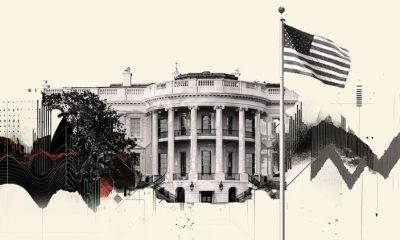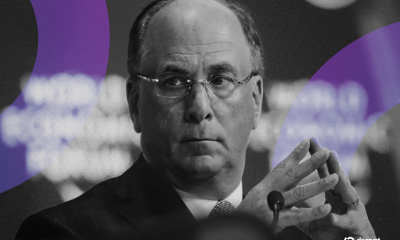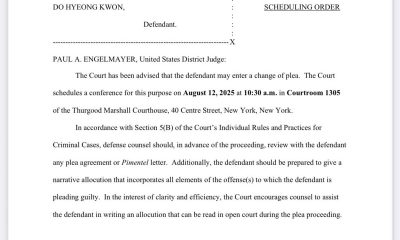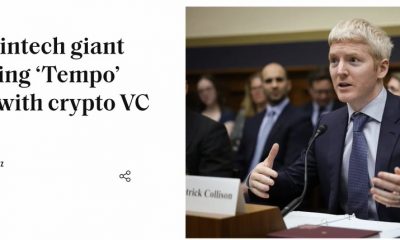

De-fi
Giving Government the Data It Needs — Not a Byte More – Crypto News
On March 20, President Trump signed an Executive Order “Eliminating Information Silos.” This means he instructed United States agency heads to effectively weave hundreds of agency databases, which include information from everything from tax filings to hospital claims, into a single, searchable vault of personal data.
The U.S. administration’s agenda could merge an internal inventory tallied by sources at more than three hundred distinct data fields, ranging from disability status to gambling winnings to passport number.
Technically, this could create more effective fraud detection with the potential to facilitate productivity; politically, this is dynamite. Although such an initiative could achieve major efficiencies, it also creates a telescope that can peer into every corner of American private lives.
The Inflection Point
For years, Americans have had to ‘pick-your-poison’: either surrender privacy so agencies can eliminate bureaucratic duplication and inefficiency or insist on privacy and accept slower, possibly wasteful public services.
What that framing misses is the quiet maturation of a class of cryptography called zero-knowledge proofs (ZKPs). While most of Washington still printed CSVs, brilliant engineers taught computers to answer yes-or-no policy questions like “Is this income below the SNAP threshold?” without revealing the underlying tax return.
In other words, we no longer have to pick between x or y; a third path is growing in the background and can provide us with efficiency and, most importantly, confidentiality.
ZKPs are a type of technology that allows one party (the prover) to convince another party (the verifier) that some given statement is true, without giving the verifier any private information. For example, an individual can go into a liquor store and prove they are 21 years of age, without having to present their driver’s license. Someone can prove that they have enough money to pay for something, without revealing how much money they actually have. ZKPs work by using math puzzles linked to locked information – meaning there is some repository of info that is used to verify the puzzle.
A ZK-enabled workflow is conceptually straightforward. Personal data — whether it sits in an agency silo, on a hospital server, or in an American’s digital wallet — never leaves home.
A prover combines the raw data with a policy formula, such as “Is adjusted gross income below thirty thousand dollars?” and emits a compact proof, typically only a few kilobytes.
When an agency verifier checks the proof and finds it valid, the benefit, license, or compliance check is cleared automatically. The government receives the answer it needs, not the data itself. And most importantly…the dreaded honeypot database never needs to exist.
It is 2025, and this tech is finally ready to hit the masses. A decade ago, producing a general-purpose proof (the basis of ZKPs) felt like scribbling quantum mechanics on a cocktail napkin. Today, more sophisticated and specialized hardware, public toolkits that let developers create ZKPs (open-source proving stacks), and developer-friendly languages such as Cairo have pushed costs down by orders of magnitude and placed “press-a-button, get-a-proof” reality squarely within reach. Some of these proofs, such as STARK proofs, are even post-quantum secure, which means they are resistant to the futuristic, ultra-powerful quantum computers that are currently being developed by a multitude of nation-states.
Regulatory pressure is mounting simultaneously. From the European Union’s Markets in Crypto-Assets (MiCA) to the United Kingdom Financial Conduct Authority’s (FCA) incoming 2026 gateway regime, watchdogs are starting to demand transparency and data protection in the same sentence.
Emailing raw spreadsheets so an auditor can rummage through them will soon feel as archaic as sending a fax in a PDF.
Public-trust debt is also coming due. Witness JPMorgan and BNY Mellon, which last week cut electronic data feeds to their own regulator after the OCC’s email system was hacked, exposing “highly sensitive” bank information. Voters see stories like that and reasonably conclude that centralized troves are data breach magnets–and they are.
If agencies want modernization without a political fuse, privacy-preserving verification tools like ZKPs are the safest path forward, and the United States should have an obligation to consider these high-tech solutions to protect American data.
Turning Theory to Practice
If the words ‘zero-knowledge proof’ still sound like science fiction, remember that the private sector is already running them in production. Benefit administrators can verify that a claimant’s income sits below a statutory cap while the underlying tax return never leaves the vault.
Procurement teams can show a contracting officer that no owner appears on a sanctions list, with no forty-column cap-table spreadsheet required. Even climate-subsidy programs can confirm a solar installer met domestic-content rules via supplier attestations instead of circulating a workbook thick enough to stop a door.
These aren’t hypotheticals; they’re extensions of the same regulated-privacy rails that banks, exchanges, and stablecoin issuers now rely on every day. The government can copy best practices instead of inventing them.
The Next Step is Already Here
As an American, as a mother, and as a General Counsel, I am frightened at the prospect of a honeypot of personal data that would inevitably be a massive target of wrongdoers. Moreso, our founders intended to protect privacy as a fundamental expression of our values. There are many modern examples where our system has lost that thread in the pursuit of efficiency, and in 2025, we should not have to choose between the two
Yes, we can build a panopticon no one trusts. Or, we could build smarter by using ZKPs to give the government exactly the data it needs — and not a byte more.
Katherine Kirkpatrick Bos is General Counsel of StarkWare, an international software development company building blockchain scaling infrastructure. Kirkpatrick Bos is a Board Member of the Illinois Blockchain Association and is based in Chicago.
-

 Technology4 days ago
Technology4 days agoChatGPT users are mass cancelling OpenAI subscriptions after GPT-5 launch: Here’s why – Crypto News
-
Technology1 week ago
Binance to List Fireverse (FIR)- What You Need to Know Before August 6 – Crypto News
-

 Technology1 week ago
Technology1 week agoBest computer set under ₹20000 for daily work and study needs: Top 6 affordable picks students and beginners – Crypto News
-
Technology1 week ago
Beyond Billboards: Why Crypto’s Future Depends on Smarter Sports Sponsorships – Crypto News
-

 Technology1 week ago
Technology1 week agoGoogle DeepMind CEO Demis Hassabis explains why AI could replace doctors but not nurses – Crypto News
-

 others1 week ago
others1 week agoBank of America CEO Denies Alleged Debanking Trend, Says Regulators Need To Provide More Clarity To Avoid ‘Second-Guessing’ – Crypto News
-
others1 week ago
Japan CFTC JPY NC Net Positions down to ¥89.2K from previous ¥106.6K – Crypto News
-

 Cryptocurrency1 week ago
Cryptocurrency1 week agoHow to Trade Meme Coins in 2025 – Crypto News
-
Business1 week ago
Analyst Spots Death Cross on XRP Price as Exchange Inflows Surge – Is A Crash Ahead ? – Crypto News
-
others1 week ago
Pi Network Invests In OpenMiind’s $20M Vision for Humanoid Robots- Is It A Right Move? – Crypto News
-
Business1 week ago
Pi Network Invests In OpenMiind’s $20M Vision for Humanoid Robots- Is It A Right Move? – Crypto News
-

 De-fi1 week ago
De-fi1 week agoTON Sinks 7.6% Despite Verb’s $558M Bid to Build First Public Toncoin Treasury Firm – Crypto News
-
Cryptocurrency4 days ago
DWP Management Secures $200M in XRP Post SEC-Win – Crypto News
-
Business1 week ago
Is Quantum Computing A Threat for Bitcoin- Elon Musk Asks Grok – Crypto News
-

 Technology1 week ago
Technology1 week agoElon Musk reveals why AI won’t replace consultants anytime soon—and it’s not what you think – Crypto News
-

 others1 week ago
others1 week agoIs Friday’s sell-off the beginning of a downtrend? – Crypto News
-

 Technology1 week ago
Technology1 week agoOppo K13 Turbo, K13 Turbo Pro to launch in India on 11 August: Expected price, specs and more – Crypto News
-
Blockchain1 week ago
Shiba Inu Team Member Reveals ‘Primary Challenge’ And ‘Top Priority’ Amid Market Uncertainty – Crypto News
-

 Technology1 week ago
Technology1 week agoOpenAI releases new reasoning-focused open-weight AI models optimised for laptops – Crypto News
-

 Blockchain1 week ago
Blockchain1 week agoCrypto Market Might Be Undervalued Amid SEC’s New Stance – Crypto News
-

 Metaverse1 week ago
Metaverse1 week agoChatGPT won’t help you break up anymore as OpenAI tweaks rules – Crypto News
-

 De-fi6 days ago
De-fi6 days agoCoinbase Pushes for ZK-enabled AML Overhaul Just Months After Data Breach – Crypto News
-

 Technology4 days ago
Technology4 days agoHumanoid Robots Still Lack AI Technology, Unitree CEO Says – Crypto News
-

 others1 week ago
others1 week agoVisa and Mastercard’s Payment Dominance Not Threatened by Stablecoins, According to Execs – Crypto News
-
Business1 week ago
Breaking: U.S. CFTC Kicks off Crypto Sprint, Explores Spot and Futures Trading Together – Crypto News
-

 Cryptocurrency1 week ago
Cryptocurrency1 week agoLido Slashes 15% of Staff, Cites Operational Cost Concerns – Crypto News
-
others1 week ago
MetaPlanet Launches Online Clothing Store As Part of ‘Brand Strategy’ – Crypto News
-

 Technology1 week ago
Technology1 week agoiPhone users alert! Truecaller to discontinue call recording feature for iOS from September 30. Here’s what you can do… – Crypto News
-

 Technology1 week ago
Technology1 week agoiPhone users alert! Truecaller to discontinue call recording feature for iOS from September 30. Here’s what you can do… – Crypto News
-

 others7 days ago
others7 days agoUS President Trump issues executive order imposing additional 25% tariff on India – Crypto News
-
Business7 days ago
Analyst Predicts $4K Ethereum Rally as SEC Clarifies Liquid Staking Rules – Crypto News
-

 De-fi7 days ago
De-fi7 days agoSEC Says Some Stablecoins Can Be Treated as Cash, but Experts Warn of Innovation Risk – Crypto News
-
Business6 days ago
XRP Price Prediction As $214B SBI Holdings Files for XRP ETF- Analyst Sees Rally to $4 Ahead – Crypto News
-

 others6 days ago
others6 days agoEUR firmer but off overnight highs – Scotiabank – Crypto News
-

 Blockchain6 days ago
Blockchain6 days agoTrump to Sign an EO Over Ideological Debanking: Report – Crypto News
-

 De-fi6 days ago
De-fi6 days agoRipple Expands Its Stablecoin Payments Infra with $200M Rail Acquisition – Crypto News
-

 others5 days ago
others5 days agoRipple To Gobble Up Payments Platform Rail for $200,000,000 To Support Transactions via XRP and RLUSD Stablecoin – Crypto News
-

 Cryptocurrency4 days ago
Cryptocurrency4 days agoHarvard Reveals $116 Million Investment in BlackRock Bitcoin ETF – Crypto News
-
others4 days ago
SEC Latest Filing Reveal Ripple Case Win Could Trigger XRP Treasury Boom Like Ethereum – Crypto News
-
Business1 week ago
Major U.S. Banks Now pushing “Chokepoint 3.0” to Kill Crypto: a16z Partner – Crypto News
-
others1 week ago
United States CFTC Oil NC Net Positions climbed from previous 153.3K to 156K – Crypto News
-

 De-fi1 week ago
De-fi1 week agoRipple CTO Admits ‘Even Ripple Can’t Use XRPL DEX’ as XRP Faces Longtime Fan’s Scrutiny – Crypto News
-

 Technology1 week ago
Technology1 week agoInfinix GT 30 5G+ confirmed to launch in India on 8 August: Expected price, specs and more – Crypto News
-

 De-fi1 week ago
De-fi1 week agoEthereum Turns 10: Experts Say ETH Could Hit $40,000 in Next Decade as Network Matures – Crypto News
-

 Blockchain1 week ago
Blockchain1 week agoGENIUS Act Could Limit Stablecoin Appeal Amid Tokenization Boom – Crypto News
-

 Blockchain1 week ago
Blockchain1 week agoTrump CFTC Pick Brian Quintenz Questioned On Kalshi Ties – Crypto News
-

 Technology1 week ago
Technology1 week agoSolo Bitcoin miners keep winning against long odds – Crypto News
-

 Cryptocurrency1 week ago
Cryptocurrency1 week agoCrypto Rises Alongside Stocks as Fed Pivot Bets Build – Crypto News
-

 Blockchain1 week ago
Blockchain1 week agoBitcoin Uptrend Over? This Week’s Price Action May Hold The Key – Crypto News
-
Business1 week ago
Trump Says He May Announce Fed Chair Powell’s Replacement “Fairly Soon” – Crypto News


















